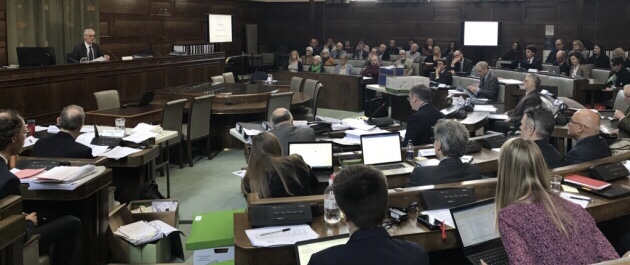I pointed out in my 23 January 2021 blog post Temporary Covid Measures – Planning, Traffic, Local Government: There May Be Trouble Ahead that after 6 May 2021 local authorities may not be able to hold virtual meetings given the expiry on that date of the temporary freedom provided by Regulation 5 of the Local Authorities and Police and Crime Panels (Coronavirus) (Flexibility of Local Authority and Police and Crime Panel Meetings) (England and Wales) Regulations 2020 , pursuant to section 78 of the Coronavirus Act 2020.
Let’s be clear – the Government has had ample time to bring forward emergency primary legislation to extend that regime if it considered that the issue was sufficiently important. But it doesn’t.
Instead, even in the face of litigation from local government bodies which is heading to a High Court hearing next month, MHCLG minister Luke Hall wrote to local authority leaders on 25 March 2021 to confirm that the power will not be extended.
The suggestions in the letter appear to be somewhat of a sticking plaster, compared to the proven solution of allowing meetings to be remotely conducted; appear to be pushing at the bounds of what is advised to be prudent in the Government’s roadmap out of lockdown, and leave us all without any Plan B.
To be clear, what we are talking about is not whether meetings should be able to be watched online – the letter encourages that in any event “to minimise the need for the public to attend meetings physically until at least 21 June, at which point it is anticipated that all restrictions on indoor gatherings will have been lifted in line with the Roadmap”.
Rather, the issue is whether participants in the meeting, whether councillors or other parties, need to be in physical attendance in order for the meeting to be lawfully conducted.
Meetings between 7 May until 17 May (or later)
If we go by the roadmap, when 7 May comes life will still be relatively restricted even assuming that by then we will have moved to step 2 of the roadmap. Whilst public buildings will be open again, people will still not be able to gather in groups, and wherever possible people will still be advised to work from home. Further opening up via step 3 will not be until 17 May or later.
The letter advises that during this period “options would include use of your existing powers to delegate decision making to key individuals such as the Head of Paid Service, as these could be used these to minimise the number of meetings you need to hold if deemed necessary. Additionally, some of you will be able to rely on single member decision making without the need for cabinet meetings if your constitution allows.”
As for annual meetings, for authorities without elections on 6 May, the letter suggests that these be brought forward to be held before 6 May (so they can still be held remotely). Otherwise, given the need to hold the meeting within 21 days of the election, the meeting can (just about) be held after 17 May (assuming that date doesn’t slip).
What does this mean for planning committee meetings? Well, even for authorities without elections, meetings between 7 and 17 May would now appear unlikely. For authorities with elections the process of selecting committee meetings at the annual meeting is going to be elongated, with committees not formed until after 17 May.
Meetings from 17 May (or later) to 21 June (or later)
The letter states:
“The Government’s roadmap proposes that organised indoor meetings (e.g. performances, conferences) are permitted from 17 May, subject to Covid secure guidelines and capacity rules.”
A few problems with this…
⁃ The roadmap actually says “no earlier than” 17 May. If we’ve learned anything from this pandemic it is that covid doesn’t respect deadlines!
⁃ What about individual councillors and other participants who may not by then have been vaccinated and therefore reluctant to attend in person (after all, the guidance as to working from home will apparently not be reviewed until some time during this step 3) or indeed may be shielding?
There is a real risk that authorities will be reluctant during this period to hold potentially controversial meetings which may attract significant numbers of members of the public. Indeed many authority buildings do not lend themselves well to such events on a socially distanced basis.
From the Local Government Association’s statement (25 March 2021):
“Councils are already actively considering the options the minister has suggested, including looking at alternative larger meeting venues at significant extra cost. The proposal to delegate significant decisions to officers is likely to be viewed as undermining democratic accountability due to the fact that such decisions are not subject to direct member involvement. Given the circumstances authorities find themselves in due to the imminent loss of virtual meeting provision, they now face unpalatable decisions, which include restricting member attendance and a reduction in members roles in decision making, whilst attempting to keep the machinery of local government moving. LLG & ADSO remain fully committed to presenting our case at the High Court Hearing timetabled to be heard before the end of April 2021.”
See also the Lawyers in Local Government’s statement The letter to Council Leaders from Luke Hall MP received yesterday (25th March 2021) does not change the need for our court hearing, in fact if anything, it makes the need for it more pressing (26 March 2021).
More generally
More generally, why let go of the flexibility that the current legal regime gives to local authorities, not just for public health reasons (although this is important, it would be foolhardy to think that from 21 June there will be no further outbreaks or no longer any need for caution) but equally for reasons of efficiency and inclusion?
The Government recognises the potential case for virtual meetings but instead kicks the can down the road by “launching a call for evidence on the use of current arrangements and to gather views on the question of whether there should be permanent arrangements and if so, for which meetings. There are many issues to consider and opinions on the detailed questions vary considerably. This will establish a clearer evidence base of opinion and enable all the areas to be considered before further decisions are made. The Government will consider all responses carefully before deciding to how to proceed on this issue.”
Don’t hold your breath then.
Simon Ricketts, 26 March 2021
Personal views, et cetera











